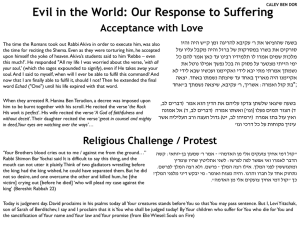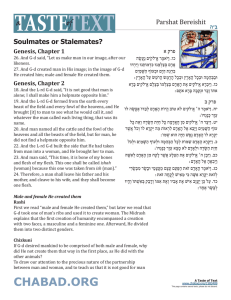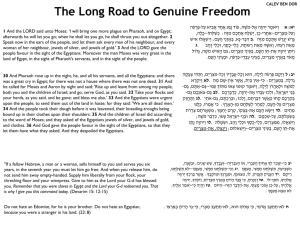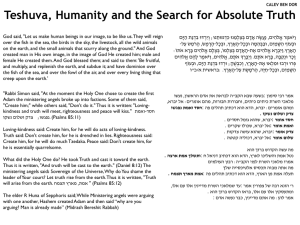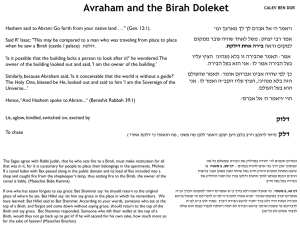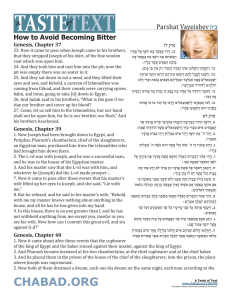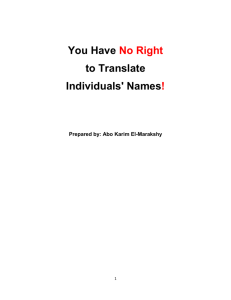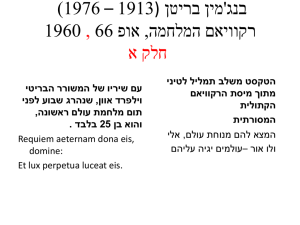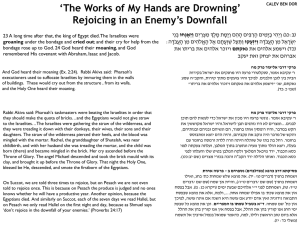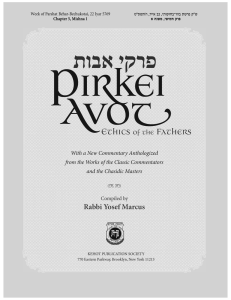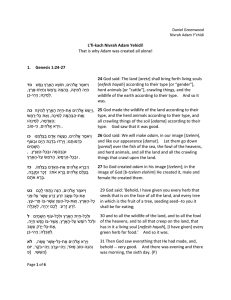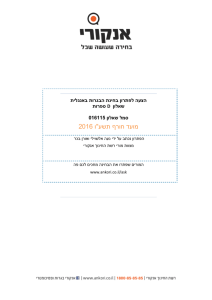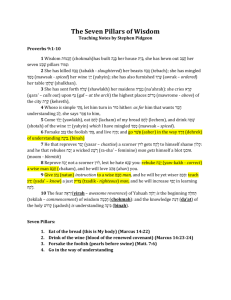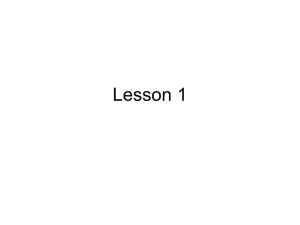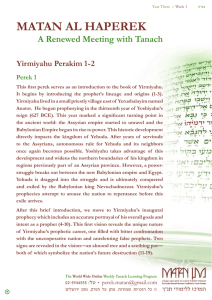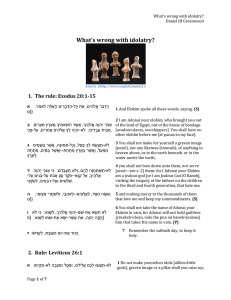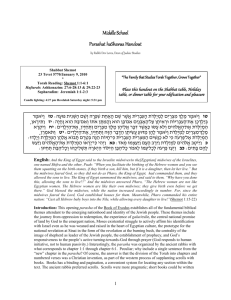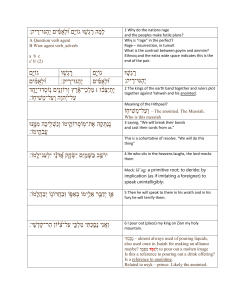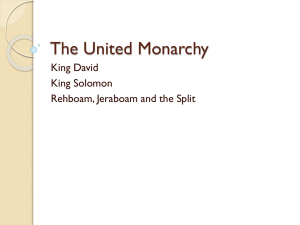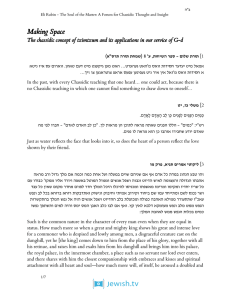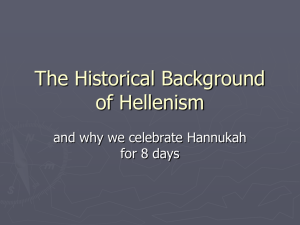Reut Institute
advertisement
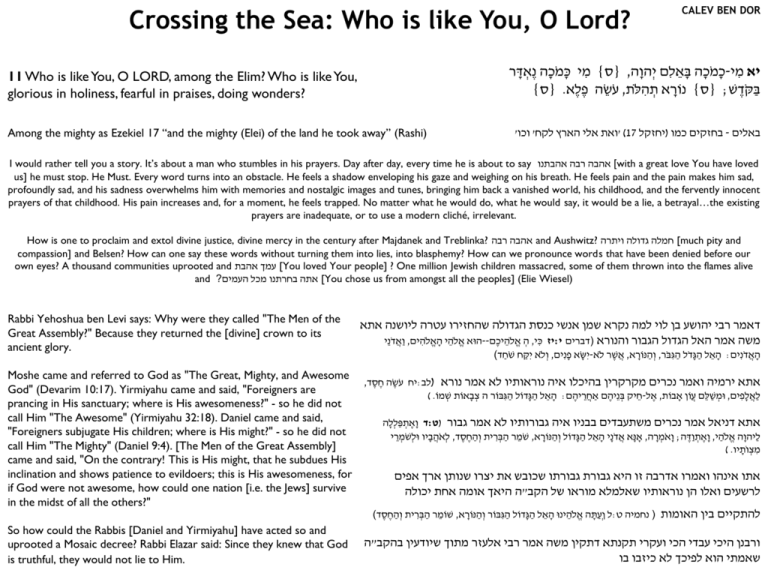
Crossing the Sea: Who is like You, O Lord?
CALEV BEN DOR
מכָה נ ְֶאדָ ר
ֹ {ס} ִּמי ָכ,מכָה בָ ֵאלִּם יְהוָה
ֹ ָכ-יא ִּמי
} {ס. עֹשֵ ה ֶפלֶא,נֹורא ְת ִּהֹּלת
ָ }בַ קֹדֶ ש; {ס
11 Who is like You, O LORD, among the Elim? Who is like You,
glorious in holiness, fearful in praises, doing wonders?
Among the mighty as Ezekiel 17 “and the mighty (Elei) of the land he took away” (Rashi)
') 'ואת אלי הארץ לקח' וכו17 בחזקים כמו (יחזקל- באלים
I would rather tell you a story. It’s about a man who stumbles in his prayers. Day after day, every time he is about to say ] אהבה רבה אהבתנוwith a great love You have loved
us] he must stop. He Must. Every word turns into an obstacle. He feels a shadow enveloping his gaze and weighing on his breath. He feels pain and the pain makes him sad,
profoundly sad, and his sadness overwhelms him with memories and nostalgic images and tunes, bringing him back a vanished world, his childhood, and the fervently innocent
prayers of that childhood. His pain increases and, for a moment, he feels trapped. No matter what he would do, what he would say, it would be a lie, a betrayal…the existing
prayers are inadequate, or to use a modern cliché, irrelevant.
How is one to proclaim and extol divine justice, divine mercy in the century after Majdanek and Treblinka? אהבה רבהand Aushwitz? [ חמלה גדולה ויתרהmuch pity and
compassion] and Belsen? How can one say these words without turning them into lies, into blasphemy? How can we pronounce words that have been denied before our
own eyes? A thousand communities uprooted and [ עמך אהבתYou loved Your people] ? One million Jewish children massacred, some of them thrown into the flames alive
and ?[ אתה בחרתנו מכל העמיםYou chose us from amongst all the peoples] (Elie Wiesel)
Rabbi Yehoshua ben Levi says: Why were they called "The Men of the
Great Assembly?" Because they returned the [divine] crown to its
ancient glory.
Moshe came and referred to God as "The Great, Mighty, and Awesome
God" (Devarim 10:17). Yirmiyahu came and said, "Foreigners are
prancing in His sanctuary; where is His awesomeness?" - so he did not
call Him "The Awesome" (Yirmiyahu 32:18). Daniel came and said,
"Foreigners subjugate His children; where is His might?" - so he did not
call Him "The Mighty" (Daniel 9:4). [The Men of the Great Assembly]
came and said, "On the contrary! This is His might, that he subdues His
inclination and shows patience to evildoers; this is His awesomeness, for
if God were not awesome, how could one nation [i.e. the Jews] survive
in the midst of all the others?"
דאמר רבי יהושע בן לוי למה נקרא שמן אנשי כנסת הגדולה שהחזירו עטרה ליושנה אתא
וַאֲ ֹדנֵי,ֹלהים
ִּ ֱהּוא אֱ ֹלהֵ י הָ א-- ְה אֱ ֹלהֵ י ֶכם,יז כִּ י:משה אמר האל הגדול הגבור והנורא )דברים י
( וְ ל ֹא י ִַּקח שֹחַ ד, ִּישָ א ָפנִּים- אֲ שֶ ר ל ֹא,ּנֹורא
ָ ַ וְ ה, הָ ֵאל הַ ָגדֹל הַ גִּ בֹר:הָ אֲ ֹדנִּים
,יח עֹשֶ ה חֶ סֶ ד:אתא ירמיה ואמר נכרים מקרקרין בהיכלו איה נוראותיו לא אמר נורא (לב
) . הָ ֵאל הַ גָדֹול הַ גִּ בֹור ה צְ בָ אֹות ְשמֹו:חֵ יק בְ נֵיהֶ ם ַאחֲ ֵריהֶ ם- ֶאל,ּומשַ לֵם עֲֹון ָאבֹות
ְ ,לַאֲ לָפִּ ים
ד ו ֶָא ְת ַפ ְללָה:אתא דניאל אמר נכרים משתעבדים בבניו איה גבורותיו לא אמר גבור (ט
ְלאֹהֲ בָ יו ּו ְלש ְֹמ ֵרי, שֹמֵ ר הַ בְ ִּרית וְ הַ חֶ סֶ ד,ּנֹורא
ָ ַ ָאּנָא אֲ ֹדנָי הָ ֵאל הַ גָדֹול וְ ה, ו ֶָא ְתוַדֶ ה; ָוא ְֹמ ָרה,לַיהוָה אֱ ֹלהַ י
) .ִּמצְ ו ָֹתיו
אתו אינהו ואמרו אדרבה זו היא גבורת גבורתו שכובש את יצרו שנותן ארך אפים
לרשעים ואלו הן נוראותיו שאלמלא מוראו של הקב"ה היאך אומה אחת יכולה
( שֹומֵ ר הַ בְ ִּרית וְ הַ חֶ סֶ ד,ּנֹורא
ָ ַל ןְעַ ָתה אֱ ֹלהֵ ינּו הָ ֵאל הַ גָדֹול הַ גִּ בֹור וְ ה:) נחמיה ט
So how could the Rabbis [Daniel and Yirmiyahu] have acted so and
uprooted a Mosaic decree? Rabbi Elazar said: Since they knew that God
is truthful, they would not lie to Him.
להתקיים בין האומות
ורבנן היכי עבדי הכי ועקרי תקנתא דתקין משה אמר רבי אלעזר מתוך שיודעין בהקב"ה
שאמתי הוא לפיכך לא כיזבו בו
Horizontal and Vertical Meaning: Elie Wiesel: In the end he will say it. “he will clench his teeth but he will say it. Because other Jews over there said it
before him. No matter what, he feels he should not be the last in the chain: the adventure that Judaism is should not stop with him. Now without his
hesitation his prayer would be an act of complacency. With it, his prayer becomes an act of remembrance.”
Religious Rebellion: Elie Wiesel “He could rebel. Stop practicing – stop worshipping. And no one would have the right to reprimand him. The Jewish
tradition, alone among all others, allows man to protest against heaven. From Abraham to Moses, from Jeremiah to Levi Yitzchak of Berditchev, there were
many who questioned God and his peculiar presence in history. But one’s rebellion must be constant; meaning it must be renewed, re-examined, reaffirmed
day after day, night after night. One must live one’s rebellion and not let it slide into indifference. One must say again and again, Ribbono Shel Olam, I know
and you know that its time to pray…but I will not do you hear me, I will not. Whoever opts for such attitude and does so with sincerity, well, his no
becomes a yes, and his refusal of prayer becomes…prayer”
Amos Oz – “Even a direct challenge is a form of engagement which is sometimes more intimate than the engagement of the museum curators who polish
the glass of locked cases. Blasphemy is also part of Jewish tradition. As is heresy as is the condemnation of God. All these are indisputable religious positions.”
Reinterpretation to Maintain Meaning: Jonathan Sacks: Once I was young, and now I am old, yet I have never watched a righteous person forsaken
nor his children begging for bread. I have translated it here according to a fine insight, author unknown, suggesting the word raiti should be understood in the
sense in which it appears in the Book of Esther, when Esther, pleading on behalf of Jewry says ‘for how can I watch the evil that shall come upon my people?
Or how can I watch the destruction of my kindred?’ (8.6) The verb there means ‘stand as a passive witness to’ Taken in this sense, Psalm 37.25 should be
understood as ‘when the righteous was forsaken or his children forced to search for bread, I never merely stood and watched’ Understood thus, it is a
warning against being a mere bystander while other people suffer. It thus brings the Grace to a symmetrical close; it began by speaking of God’s goodness in
feeding the hungry, and ends with an injuction for us to do likewise. This too is part of ‘walking in God’s ways’
"...Who is like You among the silent (mute) ones, O Lord, who is like
You, seeing the insult heaped upon Your children, yet keeping silent
"There is none like You among the silent ones, Quiet and still before
those who cause our sorrow. Our enemies multiply and rise up!"
"מי כמוך באלמים מי כמוך שומע עלבון בניך ושותק
אין כמוך באלמים \ דומם ושותק למעגימים
."צרינו רבים וקמים
